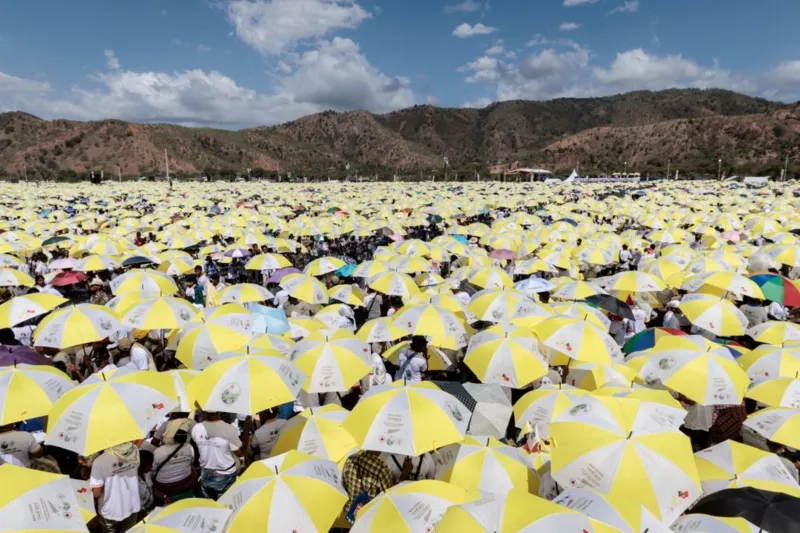Around 600,000 people gathered in a huge field outside the Timor-Leste capital Dili for the mass led by Pope Francis. The event, one of the largest events of his papacy, was attended by almost half of the country’s population. As the only Catholic-majority nation in Southeast Asia, Timor-Leste welcomed the Pope with great enthusiasm during his Asia-Pacific tour, highlighting the deep faith and spirit of the Timorese people.
Pope Francis’ visit to Timor-Leste is seen as a historic moment for this small but deeply religious country. The open-air mass was held at Tasitolu, a controversial site, but the huge crowd reflected the country’s strong Catholic faith and hope for a brighter future.
A nation united in faith
Timor-Leste, also known as East Timor, is one of the most Catholic countries in the world. For many Timorese, the Pope’s visit is a once in a lifetime experience, bringing them closer to the heart of their faith. The atmosphere at the Mass was full of emotion and devotion, as families, some of whom had travelled long distances, gathered to pray and hear the Pope’s words. The significance of the Mass was not only religious, but also symbolic. It was a moment of unity for a nation that has experienced decades of conflict and hardship. After gaining independence from Indonesia in 2002, Timor-Leste has been on a long journey towards peace and stability. The Pope’s visit, with its message of hope and reconciliation, resonated deeply with the people. Controversies surrounding the venue Although the gathering was a powerful display of faith, it was also surrounded by controversy. The Mass took place on a disputed piece of land in Tasitolu, a site that had recently been cleared of homes by the government. About 90 people were evicted from the area just weeks before the Pope’s visit, with their homes demolished. Local officials claim these residents were illegally occupying government land, but for those evicted, the demolition was a painful loss of both shelter and community. Zerita Correa, one of the evicted residents, expressed her anguish at the loss of her home and belongings. “They even destroyed our belongings inside the house,” she said. Her family, like many others, moved to Dili from rural areas in search of work and a better life. Now, they face the uncertainty of finding new housing while remaining close to their children’s schools and workplaces.
The evictions have drawn criticism and have fueled tensions in what should have been a purely festive event. However, the government says residents were warned in advance of plans to clear the area.
A troubled past: The case of Bishop Belo
Another layer of complexity to the pope’s visit is the ongoing scandal involving a prominent East Timorese clergyman, Bishop Carlos Ximenes Belo. The Nobel Peace Prize-winning bishop, once celebrated as an independence hero, has been accused of sexually abusing minors during the 1980s and 1990s. The revelations have cast a shadow over the Catholic Church in Timor-Leste and fueled calls for accountability and justice for victims.
The Vatican was reportedly aware of the allegations against Bishop Belo since 2019 and took disciplinary measures in 2020, including a restriction on his activities and a ban on voluntary contact with minors. However, many victims and their families are still waiting for more concrete action and redress.
During his visit, Pope Francis did not specifically address Bishop Belo’s case but spoke broadly about the need to protect young people from abuse. He said, “We must not forget the many children and adolescents whose dignity has been violated.” His words have received mixed reactions. Some applauded the Pope’s call for protection, while others felt it failed to directly address the issue.
Call for action from abuse survivors
The Survivors’ Network of People Abused by Clergy in Oceania has criticised the Church’s handling of the Bello case, arguing there has been insufficient action and compensation for victims. They have called on Pope Francis to allocate Church funds to compensate those affected by abuse within the Church. So far, the Pope has not met any victims during his visit.
This absence of direct contact with victims of abuse has been seen by some as a missed opportunity by the Church to show its commitment to justice and healing. As the Church faces scrutiny over its handling of abuse cases worldwide, many in Timor-Leste and beyond expect more decisive action to be taken in the future.
A message of hope and reconciliation
Despite the controversies, Pope Francis used his time in Timor-Leste to spread a message of hope and reconciliation. He praised the country’s resilience and perseverance through decades of conflict and hardship. “We are blessed by God and by the grace of God to be with all our people,” he said.
